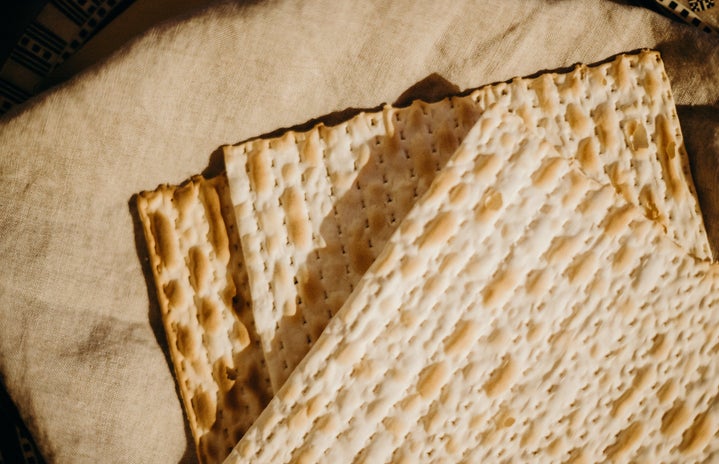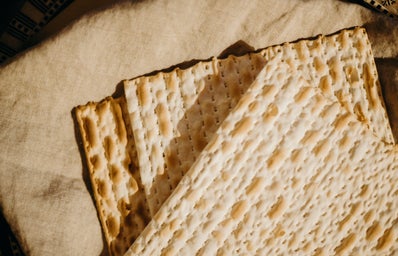Even though Judaism is the most popular religion (percentage wise) of the non-Christian faiths in the United States, not many people know about the religion itself and the meaning behind the holidays we celebrate. When I was in elementary school, I remember other kids running up to tell me I didn’t believe in God because I was Jewish. I recall becoming frustrated because I vehemently denied this and kept saying I did believe in God. When I was younger, my family was pretty religious, and even though we aren’t as much now, God is still a large part of my life and my family’s life. It can be frustrating for people to make assumptions about who you are and what you believe in based off of misinformation and ignorance. But something that hurts even more is being completely overlooked. When I started college freshman year, during Passover, I remember not being able to find matzo anywhere and being disappointed, as well as surprised, it wasn’t in stock during the holiday. This tendency for Jewish holidays and traditions to be pushed aside and completely overlooked continued as college went on. Organizations planned events on Jewish holidays, and the University of Florida even had finals week overlap with Hanukkah during fall 2020. I think if more people were educated about what these holidays, like Passover, were about and how people celebrate them, there might be a bigger push to plan around them the way society does for Christian holidays.
So, what is Passover?
Most people who aren’t Jewish tend to only know about Hanukkah because it occurs around the same time as Christmas. However, Hanukkah is not even the most important holiday in the Jewish faith. My family tended to celebrate Passover with more or similar fanfare. The short version of why we celebrate Passover is to celebrate the Hebrew people’s escape “from slavery in Egypt.” During the about weeklong celebration, we can only eat unleavened grains. This means no bread, pasta, rice, beans and a few other things. Jewish people eat an unleavened bread, which is more like a cracker, called matzo. The story I was always told in Hebrew school when I was younger was that the Hebrew people fleeing Egypt didn’t have enough time to wait for their bread to rise in the oven, so they took it out early and were met with matzo. We eat matzo during Passover to honor the struggles of the Hebrew people who fled Egypt and slavery. This doesn’t sound like this would be the basis for a fun holiday, but then again, what Jewish holiday does? Passover is actually an amazing holiday that has always been a period when I could enjoy time with my family, and I feel more connected to my faith. On the first night of Passover, my family usually has a Seder meal where we all place symbolic foods on our special Seder plate (here’s what one looks like). After dinner, my dad will hide the afikoman — a little piece of matzo — and have me and my sister look for it. The winner usually gets a small gift or just bragging rights. I loved Passover growing up and still do. Away from my family and at school, it feels different and lonelier to celebrate, especially when a lot of people around me don’t acknowledge it or know what it is.
What it feels like to not be acknowledged
When larger institutions and organizations don’t acknowledge Jewish holidays, it can be isolating and upsetting. Ariel Gordon, a 21-year-old UF communication sciences and disorders senior, commented on how she felt about people not prioritizing Jewish holidays the same way they do Christian holidays.
“I think it is easier for people to look at holidays that are celebrated by the minority of the population as insignificant or unimportant,” Gordon said. “Part of it is rooted in their lack of education as to what these holidays are, but part of it is innately insensitive.”
I agree with Gordon that most people might not feel it’s important to be aware or prioritize holidays that are not celebrated by the majority of the population. I think this is a very dangerous way to look at other religions and cultures that are not as prominent or dominant in society. The fact there is freedom of religion in this country, and it is advertised as a diverse, melting pot should mean we are aware of and respectful of all holidays and practices regardless of how many people celebrate it in this country.
Gordon said this blatant disregard for Passover and other Jewish holidays can be seen in “the school system, work calendars, business operation hours and more.”
“I think it is more or less just rooted in society,” she said.
It can hurt to have people bend over backwards to plan things around other holidays like Easter when Passover, which often happens at the same time, is forgotten.
Education and thoughtfulness is key
I do think there is hope for people to become more mindful of planning things around and acknowledging Jewish holidays in the future. I don’t think people purposely push Jewish holidays off to the wayside. But it does happen, and it hurts those of us who do celebrate. We feel like we are not important enough to be taken into consideration just because our religion is not the majority in the U.S.
Allison Langer, a 20-year-old UF business administration and public relations sophomore, also commented on this.
“When it is brought to people’s attention, they genuinely try to be accommodating,” Langer said. “It is frustrating that we somehow have to have the responsibility of saying something in the first place and bringing it to their attention though.”
I understand where Langer is coming from. During the Jewish holiday of Yom Kippur, when you have to fast for 25 hours, I have had exams scheduled and feel like too much of a nuisance to ask to take the test another day because I’m fasting. On top of that, I usually have to explain the holiday to people. Because of this, I usually end up saying nothing and taking the test. But if we don’t try to educate people and share the background of our holidays and religion with them, it’s sad to think they’ll never become educated about them.
While Passover might not be as well-known as Hanukkah, it’s still an important holiday in the Jewish faith and should be treated as such by the general public. Just because the majority of the population in the U.S. might not celebrate Passover, this doesn’t mean it should be pushed aside and ignored. It’s up to institutions and organizations to be cognizant of the fact that other religions and holidays–besides Christian ones–exist and are celebrated. I think with more education and compassion, there will hopefully be a day where Jewish holidays are acknowledged and respected instead of ignored.



